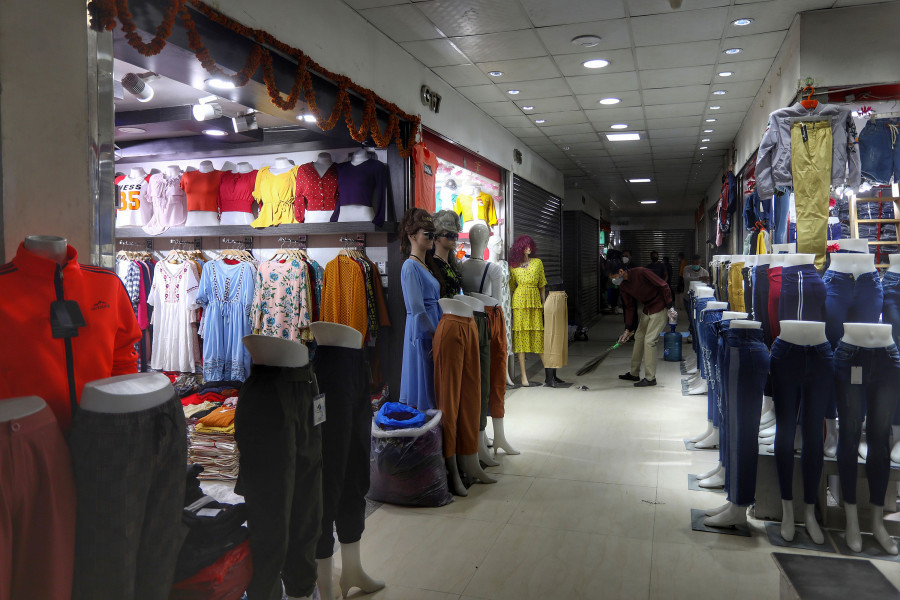Money
Petty traders selling non-essential goods getting wiped out
Preventing the spread of the virus is essential, but the rules unfairly impact small businesses over large businesses, insiders say.
Krishana Prasain
With the lockdown getting longer and longer, owners of small businesses selling “non-essential” goods are having the worst time, as they are totally shut down and their scanty savings are gone.
Petty traders say that the second lockdown has been harder for them than the first one.
The government issued prohibitory orders for the first time on April 29 after the second wave of Covid-19 started spreading disastrously, and it has been extending them a little at a time since then.
On Sunday, the chief district officers of Kathmandu, Bhaktapur and Lalitpur decided to stretch the lockdown, which would have ended on June 15, by another week till June 21 by loosening some of the restrictions.
Small businesses selling non-essential goods and commodities said the government had not listened to their pleas for some leeway.
“Preventing the spread of the virus is essential, but the rules unfairly impact small businesses over large businesses,” said Naresh Katuwal, president of the Nepal National Traders' Federation.
Under Sunday’s revised prohibitory orders, the government has permitted farming activities, and allowed grocery stores to operate with time limits and hardware shops to open in the evenings.
But the concerns of shops selling clothes, footwear, cosmetics, fancy items and electronics, among others, that have remained shuttered for a long time, have been disregarded, traders said.
“It has been one and a half months since the lockdown was imposed. The government’s response to the pandemic—conducting fewer PCR tests and not vaccinating people on a wider scale—is really poor and sad,” said Katuwal. “The government should start vaccinating small entrepreneurs so that they can get back to business.”
Anjan Shrestha, vice-president (commodity) of the Federation of Nepalese Chambers of Commerce and Industry, said the government had delayed vaccinating frontline workers in sectors like retail and wholesale and labourers.
"The hold-up in vaccinations will impact economic recovery in the long term, making it hard to revive businesses before they collapse," he said.
“As per our observation, more than 70 percent of businesses are completely closed. The rest, consisting of essential businesses, are operating at minimum capacity,” Shrestha said. He added that the government had pledged to prioritise the vaccination programme for the private sector, but it has been slow in importing vaccines.
The federation has asked the government to provide relief for businesses severely impacted by the virus by providing a waiver on bank loans, interest payments and taxes.
Katuwal said they had urged the government to address the woes of the business sector by announcing relief packages in the upcoming monetary policy.
The private sector is also holding meetings with the secretaries of the concerned ministries, including chief district officers of Kathmandu Valley, to discuss relief packages.
“If the government fails to address our problem, we will be compelled to reopen our shops at our own risk. We have waited this long, but we cannot wait any longer with hungry stomachs while the government is busy playing political games,” Katuwal told the Post.
"The traders who are struggling to survive will not be able to pay taxes this time, and if the government denies a waiver, there will be no other way except to go for a protest,” he said.
According to Katuwal, more than 10,000 traders across the country including shopping malls and plazas are associated with the federation. Due to the current lockdown, the jobs and incomes of more than 50,000 workers have been directly impacted.
"It is also not fair and somewhat illogical to allow grocery stores and vegetable shops to open as if they will not spread the virus, but stores selling non-essential products will spread the virus," Katuwal said.
"Even though traders had been gradually recovering from the first lockdown before the second lockdown was imposed, shopping malls and plazas across the country were struggling to revive their businesses when the second wave of Covid-19 hit the country," he said.
During the lockdown last year, valley traders had opened their businesses for a few hours in the morning by following the health and safety precautions recommended by the World Health Organisation.
“More than 25 percent of the traders across the country have already switched to other lines of work,” Katuwal said.
"As the lockdown has continued for more than a month with the market remaining closed, traders have stopped importing goods like clothes, footwear, cosmetics and electronic items as they have lots of unsold inventory," he added.




 13.12°C Kathmandu
13.12°C Kathmandu













